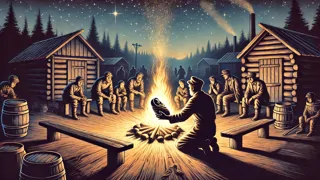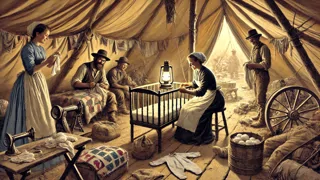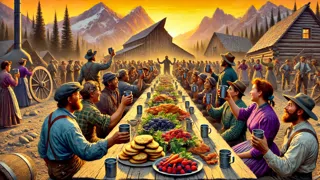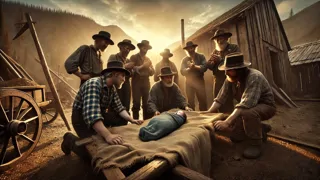Introduction
High in the rugged hills of the Sierra Nevada, Roaring Camp stood as a makeshift haven for prospectors chasing the elusive promise of gold, its wooden shanties and canvas tents clinging to steep slopes like weatherbeaten sentinels. For weeks the handful of miners carved tunnels and sifted gravel under an unforgiving sun, their calloused hands and weary faces bearing silent testimony to empty pans and fading dreams. Mornings erupted with the clang of pickaxes and the sputter of sluice boxes; nights settled around dim campfires, where hushed conversations spoke more of defeat than discovery. Then one crisp dawn, the piercing cry of a newborn shattered the silence, drawing every man from his bunk to gather around a tiny bundle wrapped in coarse flannel beneath a makeshift cot. No name accompanied the infant—only a scrap of paper urging whoever found him to care for his fragile life. Rough voices softened and harder hearts softened further as miners who had quarreled over claims joined forces to soothe the child’s wails, offering milk drawn from shared supplies and blankets scavenged from spare tents. In the days that followed, distrust gave way to camaraderie: tools were shared, meals were pooled, and laughter—once rare as water in a dry creek—broke through the gloom. The child, christened Luck by unanimous decree, became a beacon in the dusty camp, transforming hardened men into reluctant guardians and accidental family. His gurgling laughter infused every timbered cabin with warmth, and each tiny milestone carried weight far beyond the valley. The arrival of this nameless life marked the beginning of a remarkable metamorphosis, forging bonds stronger than steel and reshaping the fate of Roaring Camp with every tender coo and hopeful sunrise.
First Light and Tender Beginnings
Paragraph One:

Roaring Camp had known little more than dust and disappointment for months before Luck’s first cry. The miners awoke that morning to the same orange haze filtering through battered canvas flaps, expecting another fruitless day of panning. But when Sam Watkins, who’d been at the sluice all night, heard the faint sound of an infant, he wiped sweat from his brow and followed the noise back to the cluster of tents. There, nestled in a crude cradle of empty tin pans and old blankets, lay a newborn wrapped in flannel—fragile and crying in perfect discord with the rough melody of pick and shovel. A note pinned to his blanket read simply, “Take care of him, and good fortune will follow.”
Paragraph Two:
Instantly, hardened men who had spent days bickering over the smallest claim fell silent. Jeb McAllister, the camp’s taciturn cook, offered warm milk drawn from the communal supply while others hunted scraps of cloth for swaddling. Thomas Gonzales, whose claim had yielded nothing, hummed a lullaby he remembered from childhood, his gruff voice softening each time the baby’s eyelids fluttered. In a place where every man guarded his tools and rations jealously, the act of sharing felt as radical as striking the mother lode. Yet here they were, bound together by the helpless life before them.
Paragraph Three:
As dawn streamed between pine trunks, the circle of miners widened to include every soul at Roaring Camp: prospectors, cooks, woodcutters, even the silent prospecting drifters who usually kept to themselves. Each man took a turn at watch, patrolling while the baby slept in his improvised berth, offering quiet counsel and spontaneous prayers for his safety. The syllables of “Luck” spread like wildfire through the canyons, and by midday, nearby camps paused their own routines to share stories of surprise and silent hope. In the hush of midday, the canyon walls seemed to exhale centuries of sorrow, making space for the fragile promise of a single child.
Paragraph Four:
By evening, campfires burned brighter than usual, and tales of past glories and future dreams circled in a tapestry of new camaraderie. The miners traded gossip and gold panning tips, but now each tale carried an undercurrent of optimism. When the baby finally drifted to sleep, cradled by rough hands and surrounded by the warmth of a small community, the men of Roaring Camp realized that the greatest discovery was not in rocky seams—it was in the newfound fellowship forged by an act of unexpected compassion.
Building Bonds in the Camp
Paragraph One:

In the week that followed, the routine of Roaring Camp transformed. Mornings began with collective gentle murmurs around the cradle instead of solitary curses at another failed strike. Supplies once hoarded were now pooled: every loaf of hardtack baked carefully by Jeb was counted as communal rations; Tom Doyle, who had once carried a single pan, now held two—one for panning, one for offering extra milk. Arguments over water rights gave way to discussions on the baby’s health, weight, and next meal. When a rainstorm swept through the hills and turned the pathways to mud, the miners worked side by side to shore up lean-tos and redirect the flow, not out of obligation, but to protect the child in his makeshift nursery beneath a tarpaulin. Each nail driven and tarp secured echoed their shared commitment to something greater than gold.
Paragraph Two:
As days lengthened into weeks, Roaring Camp’s unofficial nursery took shape in a sturdy tent at the canyon’s edge, lined with feed sacks and softened by old quilts. Leila Simmons, a traveling seamstress who had been passing through and stopped to mend torn trousers, volunteered to fashion tiny garments from spare cloth. Her gentle laughter, seldom heard in the rugged settlement, became a familiar melody as she stitched miniature shirts and mittens. The miners watched in quiet amazement as scraps of fabric blossomed into delicate garments, reminding them that beauty could be coaxed from the roughest fibers.
Paragraph Three:
Not all voices in the camp welcomed this new order. Hank Calloway, a seasoned prospector known for his ruthless streak, grumbled about the child distracting them from the real work of prospecting. But even Hank paused when he saw the baby’s bright eyes follow a butterfly dancing above the creek, and something in his stern features softened. Slowly, skeptics began to yield to the shared rhythm of caretaking. Nights were spent humming lullabies rather than cleaning and oiling equipment; mornings were greeted with coos instead of curses. Each small gesture—an extra scoop of oatmeal, an improvised rocking cradle, a scrap of chewing tobacco tucked gently under the baby’s chin—marked an evolution within the men themselves.
Paragraph Four:
Then came the evening when Luck, now sturdy and inquisitive, reached out and grasped Sam Watkins’s finger with a firm grip that silenced the camp. In that instant, each miner felt a surge of protective pride and belonging. A chorus of cheers rose, echoing off the rocky walls like the roar of a newfound river. The transformation was complete: Roaring Camp was no longer a collection of solitary seekers but a family bound by compassion. As they celebrated around blazing logs, the stars above the Sierra Nevada seemed to shine a little brighter, bearing witness to a miracle born not of gold, but of shared humanity.
Hope, Hardship, and a Lasting Legacy
Paragraph One:

Summer in the high country can be generous with warmth and fierce with storms, and Roaring Camp experienced both extremes. A sudden fever swept through the settlement one humid afternoon, knocking nearly half the miners into tents for days. But even in sickness, the spirit kindled by Luck’s presence endured. When Jeb fell weak with chills, Thomas Gonzales cradled a steaming cup of broth, urging him to sip slowly while Sam and Leila fanned him with canvas shards. In the darkest moments, the baby’s innocent gurgles and contented sighs provided a balm stronger than any remedy, reminding every man why they had chosen to stay and fight for something beyond personal gain.
Paragraph Two:
As the fever broke, the camp rejoiced with a harvest feast drawn from foraged berries, salted pork, and handfuls of flour transformed into flatbread. Calloway, whose rough exterior had softened to the point of grudging care, raised a broken tin cup in salute to the child. “Here’s to Luck,” he declared, his voice thick with emotion. “May he lead us true.” The simple toast marked a turning point: the men no longer viewed the baby as someone else’s responsibility, but as the guiding heart of their collective dream.
Paragraph Three:
In the months that followed, small veins of gold began to sparkle in the riverbeds—fresh strikes that seemed almost miraculous to those who had once faced only dust. Yet even as the pan yielded tiny nuggets, the miners found their greatest treasure in shared laughter, mutual support, and the promise of a future built together. Each chunk of ore became a symbol of redemption, proof that compassion could unearth riches deeper than any vein in the rock.
Paragraph Four:
By the time Luck took his first unsteady steps, Roaring Camp had grown into a vibrant community. Neighbors traded tools freely, children—drawn by the camp’s newfound warmth—played among the tents, and the once-silent canyon brimmed with song. Journals and letters from prospectors heading home told of a place where fortune was measured not only in gold, but in the bonds forged by a single baby’s arrival. And long after the miners moved on, the legend of Roaring Camp endured—a testament to the redemptive power of kindness and the enduring luck born from unexpected beginnings.
Conclusion
As the years passed, the story of Roaring Camp and its miraculous child spread beyond the canyon walls like wildfire, carried by travelers and inscribed in letters sent to distant towns. Few camps ever saw such transformation: from hardened individualists guarding every pan and claim to a community united by care, laughter, and shared sunrise songs. Luck, the child who arrived nameless and alone, grew into a symbol of hope—reminding every man and woman who heard his story that the greatest change can spring from the smallest spark of kindness. In each weathered face that paused to cradle a hungry child, in every hand that laid down greed to offer comfort, and in every heart that learned to cherish another life above personal gain, Roaring Camp found its true fortune—not in gold, but in the selfless bonds that endure long after the pickaxes fall silent.


















